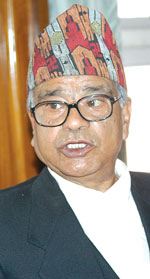 How do you as a former judge of the supreme court look at the reinstatement of parliament?
How do you as a former judge of the supreme court look at the reinstatement of parliament? Although personally I have a different view regarding this, it has helped to bring an agreement between the Maoists and the seven political parties. The SPA wants to head for a constituent assembly through parliament while the Maoists want to form a interim government and straight away head for a constituent assembly. This does not mean they are against each other, but rather that they have different approaches.
But both parties agree about the constituent assembly?
Both agree. The Maoists were also a part of the peaceful people's movement called by the SPA. Because the movement was spearheaded by the SPA and it was largely peaceful the Maoists also did not involve in acts of violence. Each one played its part and that was why the movement was effective.
Are the present actions constitutionally correct or are they only moving forward through political decisions?
The parliament restored through the People's Movement may also act according to the demands of the movement. If the conflict is to be solved in a peaceful manner it can't be done constitutionally. If there is a solution it can only come through political decisions, whether that is the reinstatement of the house or having a constituent assembly. The present constitution does not have a provision for a constituent assembly. I have always said that nothing is going to come out of having four parties in power and four on the streets.
Does that mean the 1990 constitution is now unnecessary?
Let us not say that it is unnecessary. This constitution has not been scrapped. It can only be discarded after another constitution is formed. The constitution of 1962 was scrapped by the 1990 constitution and the present constitution can only be scrapped after another is made. At present the peoples demand is to change the present constitution and that is why talks of constituent
assembly came forward. The constitution is above all and everybody must follow it and in a democratic system.The people hold sovereign power.
How will day-to-day work go ahead in a democratic manner when there is no constitution, and the process to build a new constitution is taking place? The people will make the constitution, throw it and amend it. The people have the rights and they will see to it. If there is anyone above the constitution it is the people. That is why everyone must obey this voice. There is no other alternative. There cannot be a solution without respecting the peoples voice. The people have already headed for a constituent assembly.
So the argument between the king and the parties is over?
The argument between the king and the political parties reached the people. The people have shed their blood. Now without taking the peoples sentiments into consideration neither the king nor the parties can expect to solve the crisis.
When the constitution and law is not active will this not cause problems?
Wherever there are problems it can be solved through political decisions. The main objective is to fulfil the peoples mandate. The constitution will not stop political decisions. For other matter, following the directives of the parliament and the peoples responsibilities, the rule of law must be observed.
What if a government decision is not acceptable tomorrow? Will there be space to go to the courts?
The only thing remaining is to scrap the present constitution. The people have already given a mandate to go for constituent assembly. There are no obstructions to do so now.
What is the constitution? How is it made?
The constituent assembly is where the people use their sovereign rights. The constitution is made according to what the people want which is relayed by the representatives they choose. The people decide on the structure of the state.


